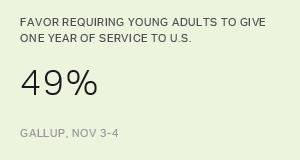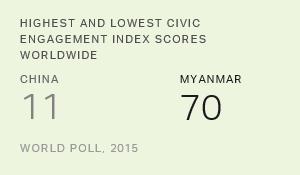Story Highlights
- 49% favor requiring young adults to serve for a year; 45% are opposed
- A majority (57%) of those younger than 30 are against the idea
WASHINGTON, D.C. -- Almost half (49%) of Americans favor requiring young men and women to give a year of service to the nation. But a majority (57%) of the group most likely to be affected -- those under the age of 30 -- oppose the idea.
| Favor | Oppose | |||||||||||||||||||||||||||||||||||||||||||||||||||||||||||||||||||||||||||||||||||||||||||||||||||
|---|---|---|---|---|---|---|---|---|---|---|---|---|---|---|---|---|---|---|---|---|---|---|---|---|---|---|---|---|---|---|---|---|---|---|---|---|---|---|---|---|---|---|---|---|---|---|---|---|---|---|---|---|---|---|---|---|---|---|---|---|---|---|---|---|---|---|---|---|---|---|---|---|---|---|---|---|---|---|---|---|---|---|---|---|---|---|---|---|---|---|---|---|---|---|---|---|---|---|---|---|
| % | % | |||||||||||||||||||||||||||||||||||||||||||||||||||||||||||||||||||||||||||||||||||||||||||||||||||
| All adults | 49 | 45 | ||||||||||||||||||||||||||||||||||||||||||||||||||||||||||||||||||||||||||||||||||||||||||||||||||
| Age | ||||||||||||||||||||||||||||||||||||||||||||||||||||||||||||||||||||||||||||||||||||||||||||||||||||
| 18 to 29 | 39 | 57 | ||||||||||||||||||||||||||||||||||||||||||||||||||||||||||||||||||||||||||||||||||||||||||||||||||
| 30 to 49 | 41 | 50 | ||||||||||||||||||||||||||||||||||||||||||||||||||||||||||||||||||||||||||||||||||||||||||||||||||
| 50 to 64 | 53 | 41 | ||||||||||||||||||||||||||||||||||||||||||||||||||||||||||||||||||||||||||||||||||||||||||||||||||
| 65 and older | 66 | 29 | ||||||||||||||||||||||||||||||||||||||||||||||||||||||||||||||||||||||||||||||||||||||||||||||||||
| Gender | ||||||||||||||||||||||||||||||||||||||||||||||||||||||||||||||||||||||||||||||||||||||||||||||||||||
| Men | 57 | 35 | ||||||||||||||||||||||||||||||||||||||||||||||||||||||||||||||||||||||||||||||||||||||||||||||||||
| Women | 41 | 55 | ||||||||||||||||||||||||||||||||||||||||||||||||||||||||||||||||||||||||||||||||||||||||||||||||||
| Party ID | ||||||||||||||||||||||||||||||||||||||||||||||||||||||||||||||||||||||||||||||||||||||||||||||||||||
| Democrats and leaners | 44 | 53 | ||||||||||||||||||||||||||||||||||||||||||||||||||||||||||||||||||||||||||||||||||||||||||||||||||
| Republicans and leaners | 57 | 38 | ||||||||||||||||||||||||||||||||||||||||||||||||||||||||||||||||||||||||||||||||||||||||||||||||||
| Gallup, Nov. 3-4, 2017 | ||||||||||||||||||||||||||||||||||||||||||||||||||||||||||||||||||||||||||||||||||||||||||||||||||||
The idea of mandatory national service has been floated numerous times by think tanks and opinion writers over the past decade and a half, but it has never become a major issue in national politics. U.S. Rep. Charles Rangel unsuccessfully pushed a version of the idea in every legislative session from 2003 to 2015; at one point, it even reached the House floor, where it was defeated by a vote of 402-2.
Though the idea has never garnered much attention as a national policy proposal, there is support for the concept among segments of the public. A majority of Republicans, including independents who lean Republican, favor it (57%), as do men (57%) and those 65 or older (66%).
Americans Supported Mandatory Service in Earlier Times
Many of those being honored in this year's Veterans Day celebrations joined the military as a result of being drafted -- a form of mandatory national service for young men that has been invoked several times in the nation's history. The use of a draft became highly controversial during the Vietnam War in the late 1960s and early 1970s; the United States ended the draft and transitioned to an all-volunteer military force in 1973.
A majority of Americans (54%) in 1977 favored sticking to a volunteer force, but two 1980 surveys showed a majority wanting to return to a military draft. Eventually, most Americans endorsed the all-volunteer concept, with five polls conducted between 1998 and 2007 showing majorities from 69% to 85% rejecting a return to the draft.
Meanwhile, as the nation shifted away from the concept of required military service for young men, Gallup in 1981 asked Americans about requiring a year of mandatory national service "either in the military forces or in nonmilitary work" for young men and, in a separate question, young women.
Majorities in 1981 favored the idea for both sexes, with more widespread support for requiring service from men (71%) than requiring it from women (54%). This contrasts with today's 49% support for mandatory service for all men and women, asked as a single question.
In terms of the demographic patterns, as is the case now, in 1981 those under the age of 30 were less likely to support the idea -- 60% for men and 48% for women. Unlike now, however, there was no significant gap on the issue between men and women or between Republicans and Democrats.
Implications
The idea that young adults should be required to serve the nation for a period of time has percolated on the national stage for many years. While Americans today are not overwhelmingly in favor of it, neither are they overwhelmingly opposed. Even among young adults -- the group most likely to be required to serve -- almost four in 10 say they favor it.
Until the proposal rises to the level of a major political issue, however, it is unclear just how firm the public's views are, or how much arguments for and against national service will be able to sway Americans' opinions.
Survey Methods
Results for this Gallup poll are based on telephone interviews conducted Nov. 3-4, 2017, on the Gallup U.S. Daily survey, with a random sample of 1,006 adults, aged 18 and older, living in all 50 U.S. states and the District of Columbia. For results based on the total sample of national adults, the margin of sampling error is ±4 percentage points at the 95% confidence level. All reported margins of sampling error include computed design effects for weighting.
Each sample of national adults includes a minimum quota of 70% cellphone respondents and 30% landline respondents, with additional minimum quotas by time zone within region. Landline and cellular telephone numbers are selected using random-digit-dial methods.
View survey methodology, complete question responses and trends.
Learn more about how the Gallup U.S. Daily survey works.



